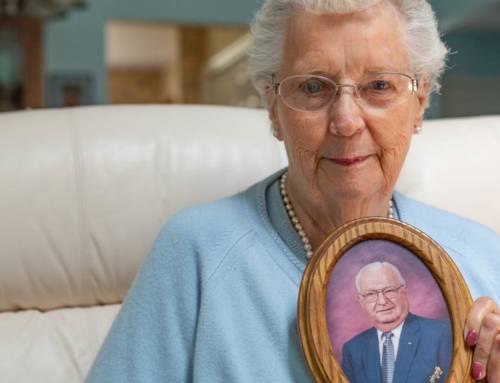
About the Author: Sunday Sermons from Sell Chapel are written by Rev. Preston Van Deursen, Director of Pastoral Care at the Masonic Village at Elizabethtown.
“You know what I don’t understand?” asked Lucy of Charlie Brown in my favorite comic strip — “PEANUTS” by Charles Schultz. “I don’t understand love!”
Charlie Brown replies, “Who does!” Lucy says, “Explain love to me, Charlie Brown”, Charlie says. “You can’t explain love. I can recommend a book or a poem or a painting, but I can’t explain love.”
Lucy comes back, “Well, try, Charlie Brown, try.”
As is always the case, Charlie can’t say no to Lucy. He can’t resist doing what Lucy tells him to do, so he says, “Well, let’s say I see this beautiful, cute, little girl walk by.”
Again, typically, Lucy interrupts. “Why does she have to be cute?, huh?, why can’t someone fall in love with someone with freckles and a big nose? Explain that!”
Poor Charlie says, “Well, maybe you are right. Let’s say I see this girl walk by with this great big nose…”. But Lucy interrupts again, “I didn’t say great big nose.”
Well, by this time Charlie Brown has had enough. He sighs that typical, woe is me sigh and says, “You not only can’t explain love, you can’t even talk about it.”
As is often the case, Charlie Brown is touching upon a profound truth. Love cannot be explained. It is beyond explanation.
In fact, love is best left unexplained. Tagore, the Indian poet put it, “Love is an endless mystery…for it has nothing to explain it.”
Tagore is only partially right. There is something to explain it. What explains it is the people who love. It’s not alone a verbal explanation, for words are never quite enough. It is explained by the lives of people who love. We see it and then we try to describe or explain it. Paul did better than anyone in the 13th Chapter of I Corinthians. He gives a kind of summary statement in verse 7: Love bears all things, believes all things, hopes all things, endures all things.”
Friends, love bears all things.
“Love is not a moral weakling. It does not indulgently sink at wrong and pretend that it does not exist. Love is not anemic and pale. Love will stand up and be counted. It is so strong that it is not bent by the fickle winds of social pressure. It has convictions that will not crumble in the face of adversity. That is why love will bear all things. Love knows that when you are dealing with the soul of a person and redemption is at stake, it does no good parading the wrong doing for public consumption. Love has redemption rather than ruination as its goal.
“James Moffat says that the rendering of the Greek words translated “bears” could also be “covers.” Thus we would have a picture of love casting a veil over the weakness and failings of others. As I was doing some reading I came across Proverbs 10: 12 says: “Hatred stirs up strife, but love covers all offenses” (Prov. 10:12). Love is willing to hurt but only for the purpose of inducing healing. Love’s attitude toward evil has redemption rather than punishment as its object.
“God deals with us in this manner. Listen to Micah, the prophet, “Who is a God like thee, pardoning iniquity and passing over transgression for the remnant of his inheritance? He does not retain his anger forever because he delights in steadfast love. He will again have compassion upon us, he will tread our iniquities under foot. Thou wilt cast all our sins into the depths of the sea” (Mic. 7:18 – 19). “Under foot” and “the depths of the sea” give us a mental image of how God covers our wrongdoing. It is the way of love.
“But “to bear” also has the meaning of carrying the burden and blame of another on your own shoulders. Do you remember that word of prophecy in Isaiah 53 that describes the coming and character of the Messiah: that we will be celebrating very shortly as our Lenten Season begins:
“Surely he has borne our grief and carried our sorrows” (Isa. 53:4a). It is the meaning of the cross. “And the Lord has laid on him the iniquity of us all” (Isa. 53:6b).
“The burden for our sin has been lifted and carried by Christ. And his love still carries us.
“Come to me, all who labor and are heavy laden, and I will give you rest” (Matt. 11:28).
You remember that special story we all know:
One night a man dreamed that he was walking along the beach with the Lord. Many scenes from his life flashed before him. In each one he noticed footprints in the sand. Sometimes there were two sets, but at other times there was only one. This bothered him, because he noted that during periods of depression, anguish, and sorrow, he could see only a single set. So he prayed in his distress, “You promised me, Lord, that you would walk with me always. But I noticed that during the most trying periods of my life there has been just one set of footprints in the sand. Why, when I needed you most, haven’t you been there?” The Lord replied with love in his eyes, “The times when only one set of footprints were made, my son, were the times that I carried you.”
“God told the Israelites that he “bore them up on eagles’ wings”, “The eternal God is your dwelling place, and underneath are the everlasting arms”
Wow! How ready are we to love in this fashion? I’m not. Are you? But the question is not readiness, but willingness. If we wait until we are ready and able we will never love as we are called to. Within ourselves we don’t have that kind of strength.
A nurse was tending the wounds of a soldier. He was left out on the field of battle for 3 days without medical attention. His wounds were not cleaned and gangrene had set in. The stench was almost unbearable. A newspaper reporter looking on said, “I wouldn’t do that for a million dollars.” The nurse responded, “Neither would I!” The question is not readiness to love but willingness. – this love that bears all things, if we are willing.
The second thing Paul says is that love believes all things. we talked about love believing the best — not keeping a record of wrongs. We don’t want to repeat all that, but the point can’t be made too often — the need for a love that believes and keeps on believing. The Jerusalem Bible translates this seventh verse, “Love is always ready to excuse, to trust, to hope, and to endure whatever comes.”
Ooou! We don’t like that. That first word: Always ready to excuse. Keep it in context now. There’s nothing naive and shallow, nothing pollyann-ish about Paul’s understanding of love. Trust is the key here. Phillips puts it, “Love knows no end to its trust.” And Barclay translates it, “Love’s first instinct is to believe in people.”
Someone once preached a compelling sermon entitled, “How Many Times Do You Take the Prodigal Back?”. His sermon was stimulated by a woman who asked that question. He had been talking about the Prodigal son, and this woman asked the question as she walked out the door following the morning worship service. He knew this woman well enough to know something of the raw nerve that his sermon had struck. She, too, had a son — a son who had been in and out of school — in and out of trouble — in an out of the house — in and out of jobs — in and out of sorts — in and out of the state. The family had taken him back over and over again, had gone to bat for him, gone with him to counseling, loaned him money, found him a job — only to have their home disrupted by his sullen silences or sudden outbursts.
“Now, as it turned out, he was home again, arriving as unannounced as he had left. His family never knew when he was coming or going. Therefore, her question, quiet as it was, carried with it the accumulated baggage of a long and painful history: “How many times do you take the Prodigal back?”
So the parable of the Prodigal son isn’t the complete answer, is it? You know the story — the young man took all of his part of the family’s wealth when he was far too young to take it — took it in his own selfish headstrong way – and headed off into a far country. He wasted that money — and ended up in the gutter. But then he came to himself and realized that even the servants back at his father’s house had it better than he. So he said to himself, I will arise and go to my father, and say to my father, “I have sinned.” And so he did. He rose. And when he got near the father’s house, the father seeing him, ran down the lane, embraced him, took him back to the house, and put a beautiful, clean robe on him, and shoes on his feet, and the signet ring of the family on his finger, and announced that the fatted calf was to be killed and a great celebration was to be held.
The story stops there — stops with that Prodigal son back at home, having been welcomed into the family.
But imagine. What if, on the morning after the party, the Prodigal son heads for the field to lift his share of the load? And what if, after a few sun drenched days on the business end of a shovel, he says, “Who needs this? This is getting to be a drag.” What if he goes off again? Does the story repeat itself? If so, how many times? When does the father began to get a bit weary of the great return? Does he always run down the road when he sees the boy coming? Does he run as fast the fifth time as he ran the first? Does he ever get to the point where he says: “Oh, no, here we go again.”
“How many times do you go through the ritual of welcoming? How many robes do you produce from the closet? How many fatted calves do you slaughter? How many rings do you place on how many fingers? How many times do you cry: “This son of mine who was lost has been found; this daughter who was dead is alive again?” How many times do you go down to the police station with bail money? How many times do you pay off a drug dealer who is threatening to break somebody’s leg for a couple of hundred dollars? How many counselors do you see? How many attorneys do you hire? How many times do you leave the door unlocked upon going to bed for the night just in case? How many times do you cook oatmeal to nurse how many hangovers?”
The story is as new as it is old. Prodigals do return — but they leave again — and they return – and they leave, and they return. “How many times do you take the Prodigal back?” I could pick at random any 20 of you who have children 13 years and older, take you home with me today, and after a bit of lunch, we could sit with a glass of tea or a cup of coffee, and tell our prodigal children stories. For some of you who are older, some of those Prodigal children have made it — hopefully, all of them have — they are grown, home from the far country, and will someday have to deal with their own prodigals. Others would be being introduced to the Prodigal syndrome. The signs are just emerging — little forays into the far country, and a quick return — but the leaving again is there, and your heart beats a little faster at the beginning of each weekend.
Others would be in the painful grip of it, and your story may be even too painful and personal to recount. Prodigals who return, but go again — and the pattern has you not only heartbroken but confused as to what it means to really love.
So, there would be a story, or stories, that would force the question, “How many times? How many times do you take the Prodigal back?”
I heard one of those painful stories last week — those stories that are played out daily in this day so wrought with chemical dependency. A beautiful young woman made that desperate call. She had made it so many times before, from a distant city, from jail, and now it came from a crack-house in our own city. And her mother – a widow with no husband to help make the decision or to add to the desperate task of parenting – the mother picks her up once more and welcomes the prodigal back home. How many times will she do it — can she do it — should she do it?
Paul says, “Love bears all things,” but the question remains, “How many times do you take the Prodigal back?”
I’ve already admitted I have no answer to the question, but there is one weighty consideration I would have you ponder as you deal with it – the weight of the Gospel itself.”
“Ours is a gospel which errs, if indeed it errs at all, on the side of forgiveness and mercy. Ours is a gospel that is abundantly clear in its counsel toward patience and hope…a gospel that talks about second miles to be traveled, cheeks to be turned, and coats to be surrendered along with cloaks…a gospel that talks about the need to track down the one who is lost at the expense of the 99 who are saved…a gospel that defines the formula for forgiveness as being 70 times 7 (which doesn’t mean that you need to forgive 490 times, but is merely another way of saying, “until you stop counting”)….a Gospel that talks about crosses to be borne, enemies to be received, strangers to be embraced, and love that is meant to be string-free …a Gospel that always sees the pearl of a person’s worth within the encrusted shell of that same person’s behavior.
“To be sure, if the father in Luke’s story is meant to be a paradigm for the heavenly Father, the message is clear. Any imbalance within the love of God is an imbalance which favors last over first, least over most, and the sickest over the one who is well. The Heavenly Father keeps no scrapbook on the number of Prodigal-like departures or returns. Praise God for that. Where would the Prodigals of this world be without it? Indeed, where would any of us be without it? Would that we could all get it right the first time, or at least the second time.
(Harold Platter brought me a poster the other day — three big words. READY — FIRE — AIM. That’s the story of our lives. We fire before we aim. We misfired back then, and we are still misfiring. It is the mark of our humanity. Fortunately, God is patient and kind.” (Ibid., Ritter).
How we work it out — the number of times we take the Prodigal back will never be easy to decide. But we must always bring the weight of the Gospel to our consideration. Loves bears all things.
I close now. I began by saying that you can’t explain love. But you do see it in persons — and when you see it, you recognize it. So, here it is in a person.




